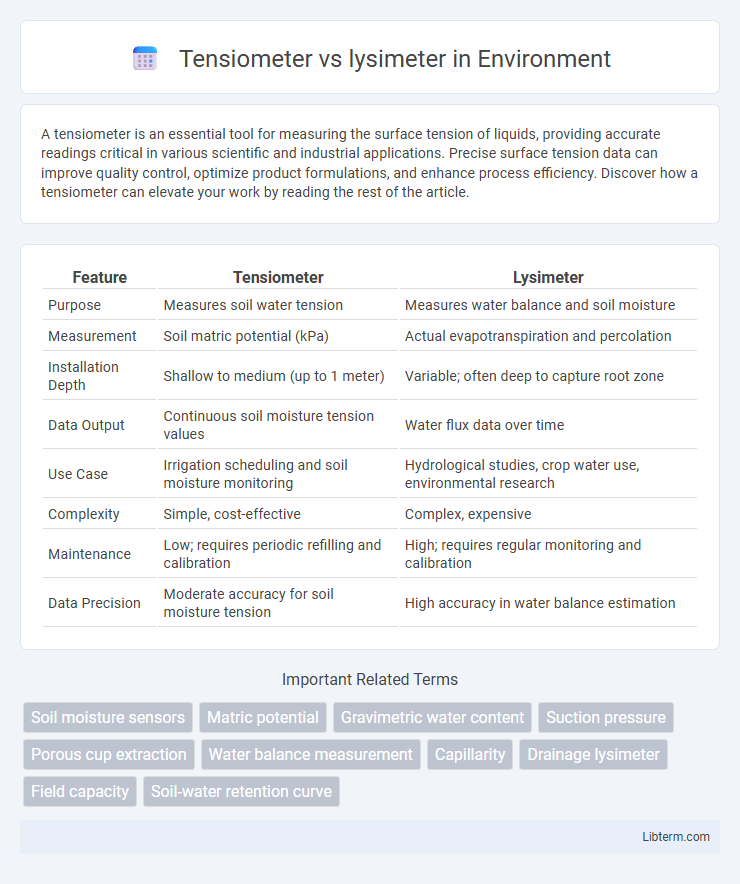A tensiometer is an essential tool for measuring the surface tension of liquids, providing accurate readings critical in various scientific and industrial applications. Precise surface tension data can improve quality control, optimize product formulations, and enhance process efficiency. Discover how a tensiometer can elevate your work by reading the rest of the article.
Table of Comparison
| Feature | Tensiometer | Lysimeter |
|---|---|---|
| Purpose | Measures soil water tension | Measures water balance and soil moisture |
| Measurement | Soil matric potential (kPa) | Actual evapotranspiration and percolation |
| Installation Depth | Shallow to medium (up to 1 meter) | Variable; often deep to capture root zone |
| Data Output | Continuous soil moisture tension values | Water flux data over time |
| Use Case | Irrigation scheduling and soil moisture monitoring | Hydrological studies, crop water use, environmental research |
| Complexity | Simple, cost-effective | Complex, expensive |
| Maintenance | Low; requires periodic refilling and calibration | High; requires regular monitoring and calibration |
| Data Precision | Moderate accuracy for soil moisture tension | High accuracy in water balance estimation |
Introduction to Soil Moisture Measurement
Tensiometers and lysimeters are essential devices for soil moisture measurement, providing critical data for agricultural and environmental management. Tensiometers measure soil water potential by detecting tension within the soil, offering real-time insights into plant water availability. Lysimeters quantify actual water movement and soil water balance by collecting drainage, enabling precise assessment of evapotranspiration and percolation under varying conditions.
What is a Tensiometer?
A tensiometer is a soil moisture measurement device that quantifies the tension or suction exerted by water in the soil, providing critical data on soil water availability for plants. It consists of a water-filled tube with a porous ceramic tip that equilibrates with the soil water pressure, allowing precise readings via a vacuum gauge. Unlike lysimeters, which measure actual water drainage and evapotranspiration, tensiometers directly monitor soil water tension to help optimize irrigation scheduling and improve water use efficiency in agriculture.
What is a Lysimeter?
A lysimeter is a sophisticated device used to measure the amount of water that percolates through soil, providing precise data on soil moisture, evapotranspiration, and nutrient leaching. Unlike a tensiometer, which measures soil water tension at specific depths, lysimeters capture comprehensive water flow by isolating a soil volume and tracking water inputs and outputs. This makes lysimeters essential for agricultural research, water resource management, and environmental studies to optimize irrigation and monitor groundwater recharge.
Working Principles: Tensiometer vs Lysimeter
Tensiometers measure soil water potential by detecting the tension exerted by water within the soil through a porous ceramic cup filled with water, providing real-time, localized soil moisture tension data. Lysimeters operate by physically measuring the amount of water lost through soil evaporation and plant transpiration by collecting percolated water in a container below the soil, offering precise measurements of water balance and evapotranspiration rates. The tensiometer's reliance on pressure gradients contrasts with the lysimeter's mass balance approach, making each suitable for different applications in soil moisture and hydrological research.
Key Differences Between Tensiometers and Lysimeters
Tensiometers measure soil water tension by directly assessing the matric potential in the root zone, providing real-time data on soil moisture availability for plants. Lysimeters quantify actual water fluxes, including evapotranspiration and percolation, by collecting and measuring drainage from a defined soil volume, offering comprehensive insights into the water balance. Key differences lie in their measurement focus--tensiometers capture soil water suction while lysimeters track water movement and volume changes--making them suitable for distinct agricultural irrigation management and hydrological research applications.
Advantages of Using Tensiometers
Tensiometers provide real-time soil moisture measurements that allow precise irrigation management, reducing water waste and enhancing crop yield. Unlike lysimeters, tensiometers are cost-effective, easy to install, and require minimal maintenance, making them suitable for continuous field monitoring. Their ability to measure soil matric potential directly supports timely irrigation decisions, improving water use efficiency in a variety of soil types.
Benefits of Lysimeters in Soil Research
Lysimeters provide precise measurements of soil water balance by capturing percolation and evapotranspiration, enabling researchers to accurately assess soil moisture dynamics and nutrient leaching. Compared to tensiometers, lysimeters offer comprehensive data on water movement within soil profiles, supporting advanced modeling of crop water use and irrigation management. This detailed insight aids in sustainable agricultural practices and environmental impact assessments.
Applications in Agriculture and Irrigation
Tensiometers measure soil moisture tension, providing direct data for irrigation scheduling and optimizing water use in crop production. Lysimeters capture actual water balance, including evapotranspiration and percolation, allowing for precise assessment of water consumption in experimental and commercial agriculture. Both tools enhance irrigation management but differ in scale and data detail, with tensiometers suited for real-time soil moisture monitoring and lysimeters for comprehensive water cycle analysis.
Limitations and Challenges: Tensiometer vs Lysimeter
Tensiometers face limitations in measuring soil water tension accurately in dry or coarse-textured soils due to cavitation and slow response times. Lysimeters, while providing precise soil moisture flux data, present challenges such as high installation costs, maintenance complexity, and limited spatial representation. Both instruments require careful calibration and site-specific adaptation to ensure reliable soil moisture monitoring and irrigation management.
Choosing the Right Device for Your Soil Study
Selecting the appropriate soil moisture measurement device depends on your specific research goals and soil conditions. Tensiometers provide accurate soil water tension readings ideal for irrigation management in fine-textured soils, while lysimeters offer comprehensive data on water balance by measuring percolation and evapotranspiration in large-scale field studies. For precise root zone moisture monitoring and plant water stress assessment, tensiometers are preferable; however, lysimeters are better suited for ecosystem-level hydrological analysis.
Tensiometer Infographic

 libterm.com
libterm.com